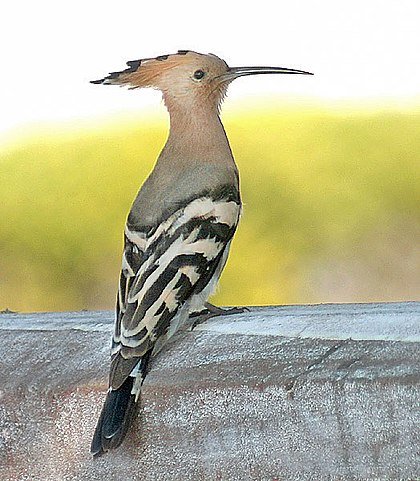Huppe fasciée
The hoopoe (scientific name: upupa epops) (in English: Hoopoe) is a bird with a distinctive crest on its head that belongs to the genus Hoopoe.
The Eurasian hoopoe (Upupa epops) is the most widespread species of the genus Upupa, native to Europe,

Asia, and the northern half of Africa.
Some taxonomists still consider the three species distinct.
Some authorities also keep the African and Eurasian hoopoe classified together, but separate the Madagascar hoopoe.
Règne : Animalia Embranchement : Chordés Classe : Oiseaux Ordre : Coracidae Famille : Huppe fasciée William Leach, 1820 Genre : Huppe fasciée Carolus Linnaeus, 1758 Espèce : Huppe fasciée
Upupa epopsThe hoopoe is one of the birds mentioned in the Holy Qur’an. It is a faithful bird that does not marry except once, even after the death of its wife. He asks for marriage by presenting a leaf, an insect or a worm in his beak, and he spreads his custom, and it is a beautiful crown, and he offers food as a dowry to whoever proposes to her to please her.
admissions .
Then he takes her to the nest that he built for her, which is usually a hole in a tree. If the nest accepts, marriage takes place, and the wife lays five to seven eggs, and after hatching, the couple takes turns feeding the young.
He is a husband, and if he finds a place for food or water, he shouts at his wife, so he does not approach the food except with her.
The hoopoe is one-sixth as long as its beak, for the ease of searching for worms and insects in the earth. The hoopoe has a sense that is not found in others, as it senses the presence of water in the interior of the earth. The Prophet Solomon relied on it as a search guide for the places of water in the bottom of the earth.
Contemporary water engineer...
Et la huppe peut voler sur une longue distance de milliers de kilomètres sans fatigue, soif ou faim, de sorte qu'elle est capable de voler d'un pays à l'autre, et pour cela le Saint Coran lui a donné la preuve qu'elle a voyagé de Saba au Yémen en Palestine. Paix.. Il a été vu dans de nombreuses situations alors qu'il écoutait sans crier l'appel à la prière, la prière ou la récitation du Noble Coran.

